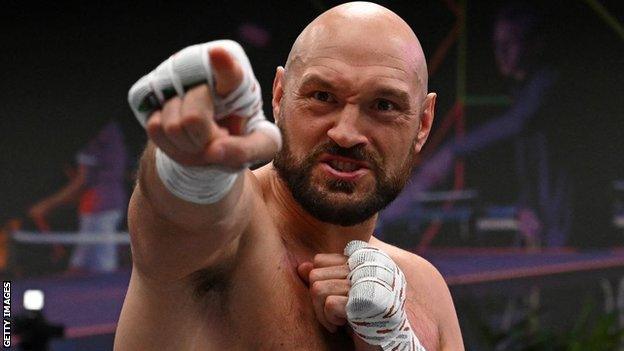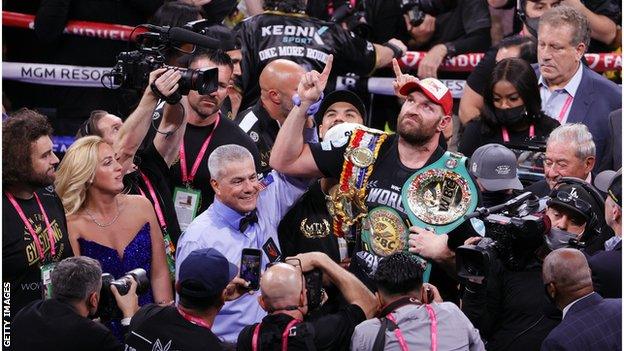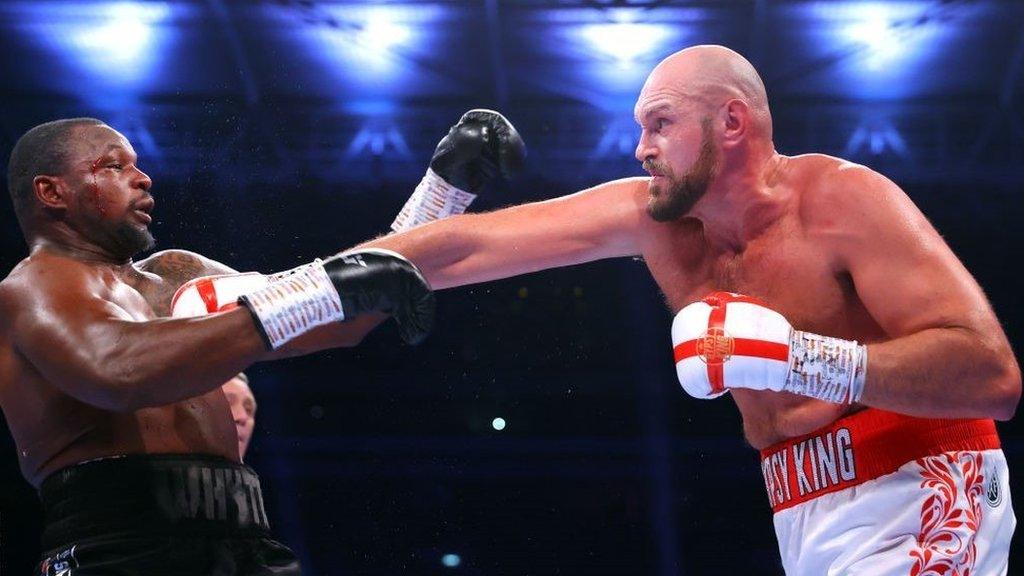Tyson Fury to retire? Profile of world heavyweight champion
- Published
- comments

World heavyweight champion Tyson Fury hinted that he will retire from professional boxing after beating Dillian Whyte
Tyson Fury's vow to retire from professional boxing could mark the end, for now at least, of an extraordinary career.
His rise, fall, and rise again may have seen a final chapter as the British fighter retained his WBC heavyweight world title with victory against Dillian Whyte.
Fury stopped his compatriot in the sixth round in front of a 94,000-capacity Wembley Stadium on Saturday.
And afterwards the 33-year-old said: "You know I promised my lovely wife Paris of 14 years that after the three [Deontay] Wilder fights that would be it, and I meant it. It was a great trilogy but I meant that.
"I got offered to fight at Wembley at home and I believe I owed it to the fans, every person in the UK, to fight at Wembley. I think this is it - this might be the final curtain for the Gypsy King. What a way to go out."
His record stands at 32 wins from 33 fights, as well as the memorable draw in his first of three meetings with Deontay Wilder.
Speaking after cruising past Whyte, Fury said: "I've won every belt there is to win, there's nothing more I can do, I've won every belt in the game.
"If this was a computer game it would definitely be completed, for sure."
Whether he stays out of the ring for good remains to be seen, with some predicting a return, but whatever happens, he will always be viewed as a popular, talented, charismatic and controversial figure.
Britain's best ever?
Few could have predicted Fury would become world heavyweight champion when he was born three months prematurely in 1988, weighing in at just 1lb, with doctors describing his chance of survival as slim.
But he grew up among boxers in a family of travellers in Wythenshawe, Greater Manchester, and won gold in the 2008 English National Championships as an amateur as well as silver in the European Junior Championships while representing Ireland.
Fury's first coach, Steve Egan, said he knew the fighter would go on to become world champion when he walked into his gym as a 14-year-old.
Tyson Fury's first coach Steve Egan recalls his first meeting with the boxer at age 14
But it was a surprise when it eventually happened, as Fury pulled off one of the great upsets in the heavyweight division with victory over then-unified world champion Wladimir Klitschko in 2015.
Fury's unconventional approach saw him dress up as Batman in the pre-fight press conference before ending Ukrainian Klitschko's nine-year reign as champion in the 25th fight of his professional career.
Victory over Klitschko in Germany would prove to be his last fight for nearly 1,000 days.
Sidelined, drugs and depression
Within a year of his greatest triumph Fury was taking drugs, binge drinking and going to sleep hoping he would not wake up.
He said he had been to the "worst place anybody could go" during his fight with depression.
Tyson Fury - I had to let go of my "outlaw" character
Rather than build on the success of beating Klitschko, he confessed to "hating boxing" and using cocaine. He relinquished his titles and tested positive for a banned steroid - something he blamed on eating uncastrated wild boar.
Fury, the self-styled 'Gypsy King', said racism directed at the travelling community fuelled some of his controversial outbursts and played a part in his mental health struggles as he contemplated taking his own life.
During that period he apologised after being criticised for comments he had made about women and homosexuality.
His weight ballooned, but he shed 10 stones on the way to a comeback in the summer of 2018 before getting his next shot at the world title against American Deontay Wilder in December of that year.
Tyson Fury: Boxer's incredible weight-loss before Deontay Wilder fight
Triumph in Wilder trilogy
Fury's remarkable return to the top of world boxing saw him survive two knockdowns in his first fight with Wilder.
In one of the most thrilling heavyweight contests for years, the Briton was floored in the ninth round and brutally dropped in the 12th and lay flat on his back before somehow regaining his feet to survive for two minutes.
Wilder was celebrating victory and the fight appeared over only for Fury to beat the count and walk to referee Jack Reiss, who ordered the pair to box on.
Fury - and much of the ringside media - felt he was ahead prior to that knockdown and had he stayed on his feet in the final three minutes, that the WBC title would have been his.
The draw, via the judges' split decision, meant the pair would meet again in February 2020 - and this time there was a clear winner.
The unbeaten Fury produced the most destructive performance of his career to end Wilder's five-year reign as WBC heavyweight world champion with a seventh-round knockout.

Fury celebrates in the ring with his belt and his entourage, including wife Paris
Fury floored his opponent in the third and fifth rounds, before sealing victory in a dominant display.
Wilder exercised his right to a third fight and when the pair met again in October 2021, it was another classic.
Fury recovered from being floored twice earlier to deliver a stunning knockout in the 11th round to bring this chapter of heavyweight boxing to a close.
A unification bout against fellow Briton Anthony Joshua had been touted, but it never materialised as the latter lost his titles to Ukraine's Oleksandr Usyk.
The controversies
Fury asked to be removed from the shortlist of six candidates for the BBC's annual Sports Personality of the Year award in 2020.
It followed a petition signed by more than 50,000 people to remove him as a contender in 2015 after controversial comments he had made in the past about homosexuality resurfaced.
He remained on the shortlist and finished fourth before apologising publicly for his comments.
Fury did, however, attend the awards ceremony in 2018 and was praised for his message on mental health.
"There's a lot of people still living in darkness and too afraid to speak about it publicly," he said.
"But if I can do it, the heavyweight champion of the world - 6ft 9in, 19 stone - I'm supposed to be a big tough guy, anybody can come out and get help."
'If I can do it, anybody can' - Fury's message on mental health
There was also a link with Daniel Kinahan, who was among seven people hit with worldwide financial sanctions by the United States earlier this month because of alleged involvement with organised crime.
But speaking before the bout with Whyte, Fury - who had previously been advised by the Irishman - said he had "absolutely zero" involvement with Kinahan, either in a business or advisory role.
Fury was not distracted in the build-up to the Whyte fight and went out, for now at least, on a high as one of British boxing's most colourful careers ended in victory.

House of Maxwell: The story of one of the most extraordinary family sagas the world has ever seen
'A band of oddities, gentlemen and pirates': Your first look at the exciting new drama SAS Rogue Heroes from the creator of Peaky Blinders

Related topics
- Published16 October 2022
